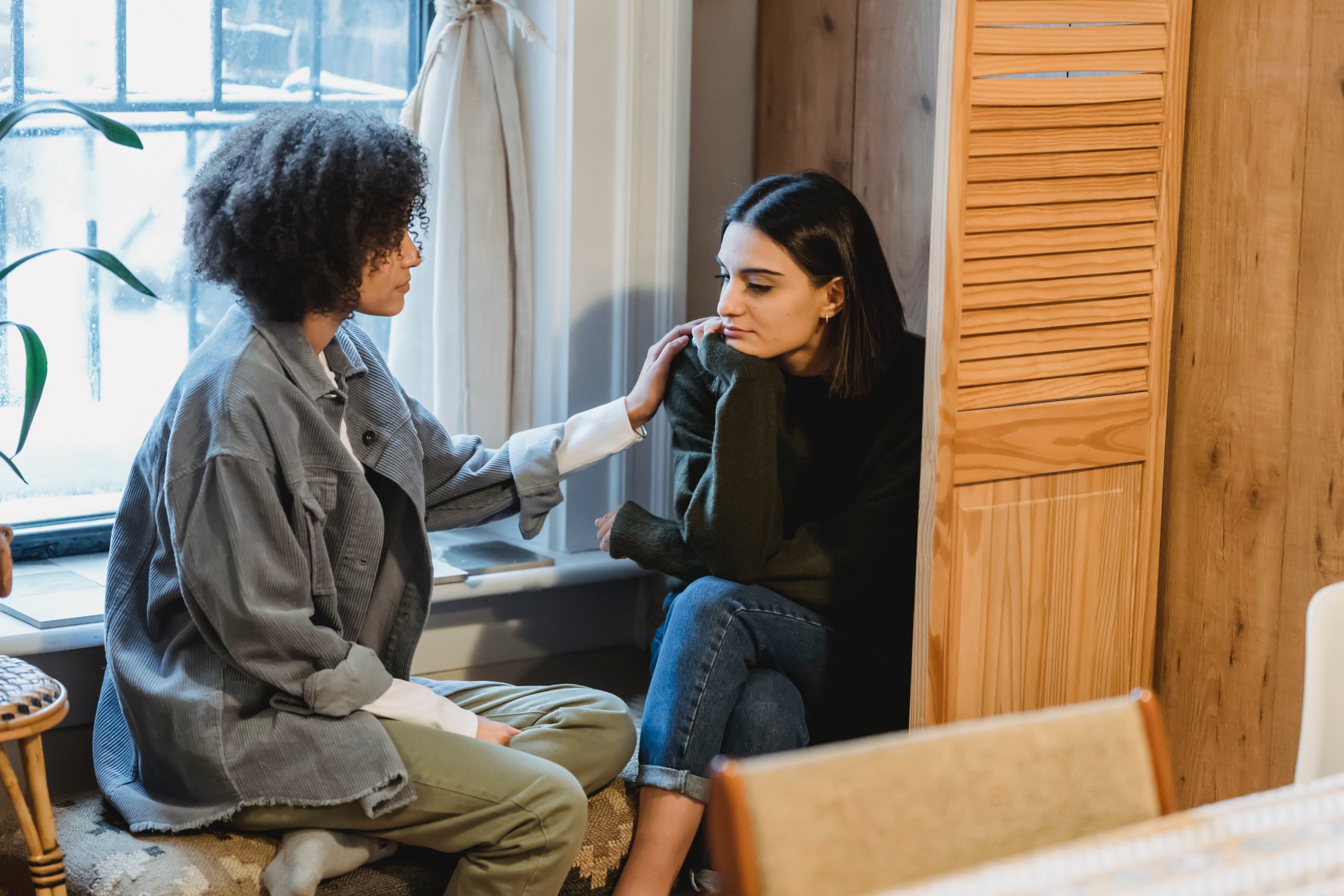How and When to Help a Friend Reach Out for Support

When you start a conversation with a friend you’re worried about, the hope is that they will acknowledge they’ve been struggling, be honest with you about their situation, and be open to seeking help. As a supportive friend, what can you do next to help a friend in need?
Encouraging a Friend to Seek Therapy
There are a lot of misconceptions about therapy—like it’s only for people with serious conditions, it’s a luxury for people who can afford it, or it’s a sign that we can’t handle things on our own.
We all have different comfort levels with seeking therapeutic help when we are feeling overwhelmed. Each of us are influenced by the perspectives of our family and friends, our cultural background, and our personal experiences. Some people are from cultures, communities, or families where reaching out for help from a therapist or counselor is not encouraged. In some cases, seeking professional help may actually be looked down on as a sign of weakness.
The reality is that mental health professionals like counselors, therapists, and psychologists are trained to help people deal with a wide range of issues, from managing stress and anxiety to processing grief and trauma to treatment for substance misuse and addiction. Mental health professionals themselves come from a wide variety of backgrounds, and many are sensitive to issues of race, age, gender identity, sexual orientation, and more. There are also free or low-cost options available.
What You Can Do to Encourage Your Friend to Get Help
- Remind your friend that seeking help for their mental health is a sign of strength. Addressing a problem before it gets worse takes courage and discipline. And it makes sense to seek professional help for something we do not naturally know a lot about or cannot figure out on our own. If it helps, you can liken it to visiting a doctor for a physical, seeing a financial advisor to get better at saving, working with a coach to improve their athletic ability, or getting a tutor when struggling with a subject in school.
- If you have positive personal experience about reaching out for support, use your story to encourage your friend to do the same.
- Remind them that they can try it out and, if it’s not the right fit, change therapists or change approaches. The important thing is to try. Thinking of a first therapy session as an interview or testing out whether a therapist is a good fit can help your friend remember that they have choices and control over the process.
- If you have contacts or are otherwise comfortable scouting for options, offer to help them look for a therapist and make an appointment. When we’re really overwhelmed, the task of finding help can seem daunting. Offering up options may make it more likely that they’ll follow through with making an appointment.
- If your friend is anxious about their appointment, you can offer to go with them to their first session and wait outside, or to meet them afterwards.
- Refer them to our articles, such as What is Therapy and Will it Work? , How to Find the Right Therapist, and What to Expect From the First Therapy Session.
- If your friend still seems resistant to the idea of therapy, check out our tips on how to talk to a friend who isn’t receptive to help.
Where and How to Look for Mental Health Support
You can help a friend find a therapist, counselor, or support group. Here are some tips about how to find a therapist:
- Ask for a referral from a friend, family member, or trusted colleague.
- Check to see if your friend’s campus or workplace has a counseling service, employee assistance program, or options for referrals.
- Your friend can ask for a referral from their doctor, nurse, or medical professional.
- If your friend is struggling with addiction and recovery, look for local chapters of support groups such as Alcoholics Anonymous or Narcotics Anonymous.
- Use a treatment services locator to find mental health professionals in your area.
- Explore virtual treatment options through services like Betterhelp and Talkspace.
- Some insurance plans have directories of mental health professionals that take their plans.
Finding Affordable Mental Health Support
If your friend doesn’t have insurance or can’t afford certain treatment options, there are community centers and organizations that offer free counseling, government agencies that offer mental health services, as well as therapists who work on a sliding fee scale. You can use the SAMHSA treatment services locator to find free or low-cost options in your area.
Find out about 7 Ways to Find Affordable Mental Health Care
If Your Friend Needs Help Immediately
- 988 Lifeline: Call or text 988, or chat online. For TTY Users: Use your preferred relay service or dial 711 then 988.
- Crisis Text Line: Text “START” to 741-741
- Substance Abuse and Mental Health Services Administration (SAMHSA) 24/7 Treatment Referral National Helpline: Call 1-800-662-4357
- National Domestic Violence Hotline: Call 1-800-799-SAFE (7233), chat online, or text START to 88788
- National Runaway Safeline: Call 1-800-RUNAWAY (1-800-786-2929) or chat online
- Rape Abuse & Incest National Network (RAINN): Call 1-800-656-HOPE (4673) or chat online
- Trans Lifeline: Call 1-877-565-8860
- The Trevor Project (LGBTQ+) Helpline: Call 1-866-4UTREVOR (1-866-488-7386), chat online, or text START to 678 678
- Veterans Crisis Line: Call 1-800-273-8255, chat online, or text 838255
If it is a medical emergency or if there is immediate danger of harm, call 911. Let the operator know that you are calling about a mental health emergency and follow these tips to ensure the police arrive prepared to respond appropriately.
If you’re worried about yourself or a friend, trust that instinct and take action now.






